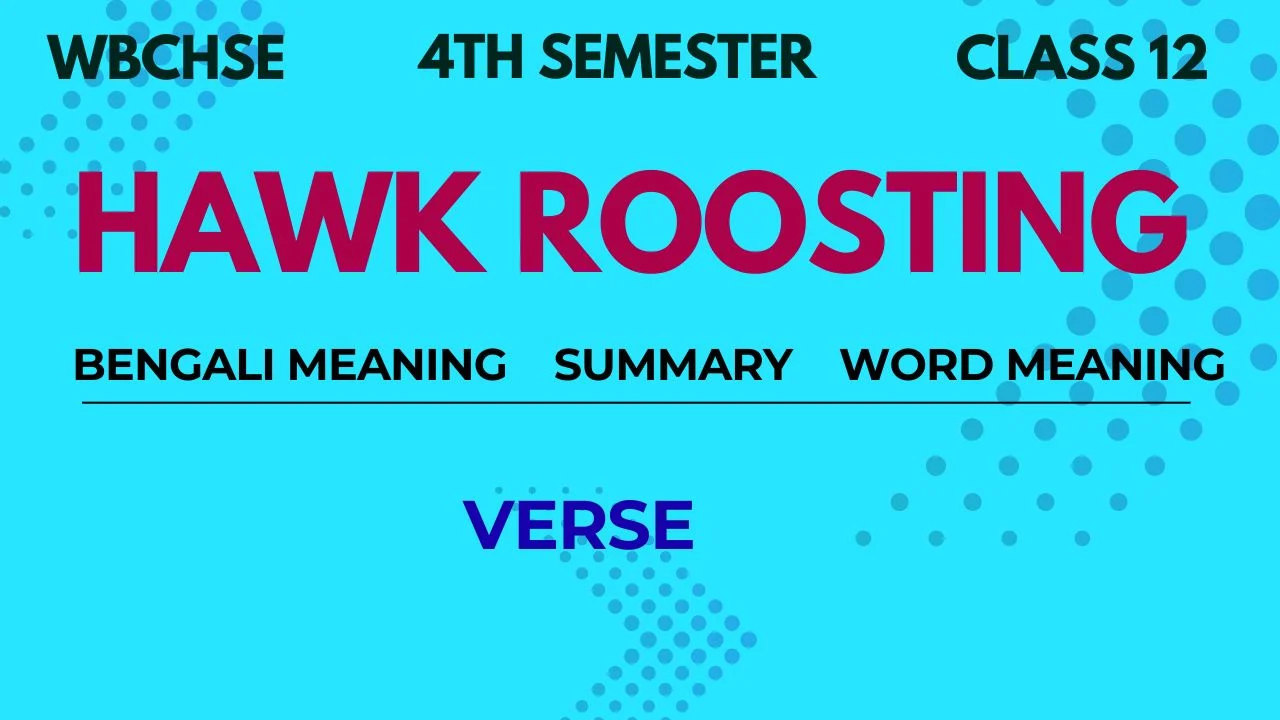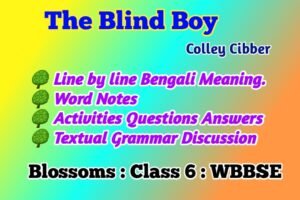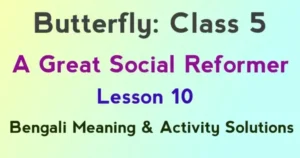Hawk Roosting Summary and Bengali Meaning WBCHSE – This article provides a complete summary and natural Bengali meaning of the poem Hawk Roosting for Class 12, 4th Semester WBCHSE students. It explains the hawk’s perspective, power, and dominance in nature, making it easy for students to understand. The content is fully aligned with WBCHSE 4th Semester syllabus requirements.
About the Poet:
Ted Hughes (1930–1998) was one of the most influential British poets of the 20th century. His poetry is known for its powerful and vivid imagery, often focusing on nature and the wild, untamed forces of life. He was deeply interested in the relationship between the natural world and human existence. His works frequently explore themes of survival, violence, and instinctual behavior. “Hawk Roosting” is a prime example of his fascination with nature, showing its ruthless and predatory aspects.
Summary:
The poem “Hawk Roosting” by Ted Hughes presents the perspective of a powerful hawk, a bird of prey. The hawk sits calmly and proudly at the top of a tree, observing the world below. It believes that everything in nature—the trees, air, sun, and earth—exists for its benefit. Killing, flying, and ruling are its natural rights, and even in sleep it dreams of perfect kills and eating its prey. Its sharp claws and hooked beak give it strength and control. The hawk symbolizes power, dominance, arrogance, and confidence, showing the harsh reality of nature where the strong survive. The poem is a dramatic monologue that also reflects themes of authority, control, and the natural order. It can be read as a commentary on dictatorship, portraying the mindset of a ruler who believes in absolute power. Hughes shows nature as both beautiful and merciless, where survival depends on strength and instinct.
টেড হিউজের “Hawk Roosting” কবিতায় একটি শক্তিশালী শিকারি পাখির দৃষ্টিভঙ্গি দেখানো হয়েছে। বাজপাখি গাছে বসে শান্ত ও গর্বিতভাবে নিচের পৃথিবী পর্যবেক্ষণ করছে। এটি মনে করে প্রকৃতির সবকিছু—গাছ, বাতাস, সূর্য এবং পৃথিবী—তার সুবিধার জন্যই তৈরি। হত্যা করা, উড়া এবং শাসন করা তার স্বাভাবিক অধিকার, এবং ঘুমের ভেতরেও এটি নিখুঁত শিকার এবং খাওয়ার স্বপ্ন দেখে। তার তীক্ষ্ণ নখ ও বাঁকা ঠোঁট তাকে শক্তি এবং নিয়ন্ত্রণ দেয়। বাজপাখি ক্ষমতা, আধিপত্য, অহংকার এবং আত্মবিশ্বাসের প্রতীক, যা প্রকৃতির কঠোর বাস্তবতা দেখায়—যেখানে শক্তিশালীই বেঁচে থাকে। কবিতাটি একটি ড্রামাটিক মনোলগ, যা ক্ষমতা, নিয়ন্ত্রণ এবং প্রাকৃতিক নিয়মের বিষয়গুলোও প্রকাশ করে। এটি স্বৈরাচার বা কর্তৃত্ববাদী শাসনের প্রতিফলন হিসেবেও পড়া যেতে পারে, যেখানে শাসক নিজেকে সম্পূর্ণ ক্ষমতার অধিকারী মনে করে। হিউজ প্রকৃতিকে সুন্দর কিন্তু নিষ্ঠুর হিসেবে দেখিয়েছেন, যেখানে বেঁচে থাকা নির্ভর করে শক্তি এবং স্বাভাবিক প্রবৃত্তির ওপর।
| Short Type and Long Type Questions Answers: Hawk Roosting |
Justification of The Title:
The title “Hawk Roosting” is perfectly justified because the poem is entirely from the perspective of a hawk sitting at the top of a tree. The word “roosting” means perched or resting, and the poem begins with the line, “I sit in the top of the wood, my eyes closed,” showing the hawk resting but alert. Even while sitting, the hawk dreams of perfect kills and imagines its dominance over nature. The hawk speaks of its power, control, and natural rights, emphasizing its supreme position. Lines like “I kill where I please because it is all mine” and “My eye has permitted no change” show the hawk’s confidence and authority. The title captures the calm yet commanding presence of the hawk as it observes, rules, and dominates from its roost. Thus, the title reflects both the hawk’s physical position and its symbolic dominance in nature.
বাজপাখি তার ক্ষমতা, নিয়ন্ত্রণ এবং স্বাভাবিক অধিকার নিয়ে কথা বলে, তার শীর্ষস্থানীয় অবস্থানকে গুরুত্ব দেয়। যেমন লাইনে বলা হয়েছে, “I kill where I please because it is all mine” এবং “My eye has permitted no change”, যা বাজপাখির আত্মবিশ্বাস এবং আধিপত্য দেখায়। শিরোনামটি বাজপাখির শান্ত কিন্তু কর্তৃত্বপূর্ণ উপস্থিতি প্রকাশ করে, যা তার বসার জায়গা থেকে পৃথিবী পর্যবেক্ষণ, শাসন এবং আধিপত্য স্থাপনকে নির্দেশ করে। তাই শিরোনামটি বাজপাখির শারীরিক অবস্থান এবং প্রকৃতিতে তার প্রতীকী আধিপত্য উভয়কেই প্রতিফলিত করে।
- Hawk → a bird of prey, a strong hunting bird that catches animals for food.
- Roosting → sitting or resting on a perch, usually a tree, as birds do.
“Hawk Roosting” means: “A hawk sitting or resting on a tree/perch. It refers to the hawk perched calmly but alert, usually before or after hunting.
- Hawk → শিকারি পাখি, শক্তিশালী একটি বাজ পাখি যা অন্য প্রাণী শিকার করে।
- Roosting → কোনো গাছে বা ঠাঁইয় বসে থাকা বা বিশ্রাম নেওয়া।
“একটি শিকারি পাখি গাছে বসে বা বিশ্রাম নিচ্ছে।” এটি বোঝায় পাখিটি শান্তভাবে বসে আছে কিন্তু সতর্ক, সাধারণত শিকারের আগে বা পরে।
Central Idea of Hawk Roosting
The poem shows the pride and power of a hawk sitting on a tree, looking at the world. The hawk believes that everything in nature — trees, air, sun, and earth — is made for him. It feels that killing, flying, and ruling are its natural rights. The hawk represents domination, violence, and confidence in power. Through the hawk, the poet tells us about the harsh reality of nature, where the strong survive. Ted Hughes uses the hawk as a symbol of power and authority. The hawk speaks with arrogance, claiming full control over life and death. The poem shows the dark side of nature—cruelty, killing, and selfishness—but also the natural order. It can also be read as a picture of human rulers or dictators who think they have absolute control. Thus, the poem is both about the hawk and about the nature of power itself.
কবিতায় দেখানো হয়েছে একটি বাজপাখির গর্ব এবং ক্ষমতা, যা গাছে বসে পৃথিবীকে দেখছে।বাজপাখি মনে করে প্রকৃতির সবকিছু — গাছ, বাতাস, সূর্য, পৃথিবী — তার জন্য তৈরি।এটি মনে করে হত্যা করা, উড়া এবং শাসন করা তার স্বাভাবিক অধিকার। বাজপাখি আধিপত্য, সহিংসতা এবং ক্ষমতায় আত্মবিশ্বাসের প্রতীক। কবি বাজপাখির মাধ্যমে প্রকৃতির কঠোর বাস্তবতা দেখান, যেখানে শক্তিশালীই বেঁচে থাকে। টেড হিউজ বাজপাখিকে ক্ষমতা এবং আধিপত্যের প্রতীক হিসেবে ব্যবহার করেছেন। বাজপাখি অহংকারপূর্ণভাবে কথা বলে, জীবন এবং মৃত্যুর ওপর সম্পূর্ণ নিয়ন্ত্রণ দাবি করে। কবিতায় প্রকৃতির অন্ধকার দিক দেখানো হয়েছে—নির্দয়তা, হত্যা, স্বার্থপরতা—কিন্তু একই সঙ্গে প্রাকৃতিক নিয়মও বোঝানো হয়েছে। এটিকে মানব শাসক বা স্বৈরাচারীদের প্রতীক হিসেবেও দেখা যেতে পারে, যারা মনে করে তারা সম্পূর্ণ নিয়ন্ত্রণে। তাই, কবিতাটি শুধু বাজপাখি নিয়ে নয়, বরং ক্ষমতার প্রকৃতি সম্পর্কেও জানায়।
Bengali Meaning & Word Notes of the Poem
Stanza 1
I sit in the top of the wood, my eyes closed.
আমি জঙ্গলের মাথায় বসে আছি, আমার চোখ বন্ধ।
Inaction, no falsifying dream
কোনো কাজ নেই, কোনো মিথ্যা স্বপ্ন নেই।
Between my hooked head and hooked feet:
আমার বাঁকা মাথা আর বাঁকা পায়ের মাঝখানে।
Or in sleep rehearse perfect kills and eat.
অথবা ঘুমের মধ্যেই নিখুঁত হত্যার অনুশীলন করি এবং খাই।
Summary:
The hawk sits calmly at the top of the forest with closed eyes. It is at rest but still powerful, needing no false dreams. Its hooked head and feet show its natural design for killing. Even in sleep, it imagines perfect kills and eating its prey. These lines show the hawk’s confidence, pride, and instinct for violence.
বাজপাখি শান্তভাবে জঙ্গলের মাথায় বসে আছে চোখ বুজে। সে বিশ্রামে আছে, তবু শক্তিশালী, তার কোনো মিথ্যা স্বপ্ন নেই। তার বাঁকা মাথা ও বাঁকা পা প্রমাণ করে, সে জন্মগতভাবে শিকারী। এমনকি ঘুমের ভেতরেও সে নিখুঁতভাবে শিকার করার স্বপ্ন দেখে। এই স্তবকে বাজপাখির আত্মবিশ্বাস, গর্ব আর সহিংস প্রবৃত্তি প্রকাশ পেয়েছে।
Word Notes:
Sit : rest/stay : বসা
Closed : shut : বন্ধ
Inaction : idleness : কর্মহীনতা
Falsifying : deceiving : মিথ্যা/প্রতারণা
Hooked : curved/bent : বাঁকা
Rehearse : practise : অনুশীলন করা
Kill : slay : হত্যা করা
Eat : consume : খাওয়া
Stanza 2
The convenience of the high trees!
উঁচু গাছগুলো আমাকে দেয় নিরাপত্তা এবং সুবিধা।
The air’s buoyancy and the sun’s ray
বাতাসের ভাসমানতা আর সূর্যের উষ্ণ আলো আমাকে সাহায্য করে।
Are of advantage to me;
প্রকৃতির সবকিছুই আমার সুবিধার জন্য।
And the earth’s face upward for my inspection.
পৃথিবী যেন আমার দৃষ্টি পড়ার জন্য উঁচু মুখ করে দাঁড়িয়েছে।
Summary
The hawk explains how high trees give it safety and advantage. The air’s buoyancy and the warmth of the sun help its flight. Everything in nature seems to support the hawk’s life. The earth looks upward as if offered for its inspection. This stanza shows the hawk’s belief that nature itself serves it.
বাজপাখি বলে উঁচু গাছ তাকে নিরাপত্তা ও সুবিধা দেয়। বাতাসের ভাসমানতা আর সূর্যের উষ্ণতা তাকে উড়তে সাহায্য করে। প্রকৃতির সবকিছু যেন তাকে সাহায্য করার জন্য কাজ করে। পৃথিবীও যেন মাথা তুলে দাঁড়ায় কেবল তার দৃষ্টির জন্য। এই স্তবক বোঝায় বাজপাখি ভাবে, প্রকৃতি নিজেই তার সেবক।
Word Notes:
Convenience: usefulness/comfort: সুবিধা
High : tall : উঁচু
Buoyancy : lightness/float : ভাসমানতা
Ray : beam : রশ্মি
Advantage : benefit : উপকার
Earth : globe : পৃথিবী
Inspection : observation/check : পরিদর্শন
Stanza 3
My feet are locked upon the rough bark.
আমার পা শক্তভাবে খসখসে ছালে আটকে আছে।
It took the whole of Creation
পুরো সৃষ্টিকেই লাগে,
To produce my foot, my each feather:
আমার পা এবং প্রতিটি পালক তৈরি করতে।
Now I hold Creation in my foot.
আর এখন আমি আমার পায়ে পুরো সৃষ্টিকেই ধরে রাখি।
Summary:
The hawk grips the rough bark strongly with its feet. It says all of Creation worked to make its body. Each feather and each claw is a result of nature’s effort. Now it holds Creation itself in its powerful grip. This stanza highlights the hawk’s arrogance and its sense of superiority.
বাজপাখি শক্তভাবে খসখসে ছালে তার পা গেঁথে রেখেছে। সে বলে, তার শরীর তৈরি করতে পুরো সৃষ্টিই পরিশ্রম করেছে। প্রতিটি পালক আর নখর প্রকৃতির প্রচেষ্টার ফল। এখন সে তার পায়ে পুরো সৃষ্টিকেই ধরে রেখেছে। এই স্তবক বাজপাখির ঔদ্ধত্য আর তার শ্রেষ্ঠত্ববোধকে প্রকাশ করে।
Word Noes:
Feet : claws : পা/নখর
Locked : fixed/fastened : শক্তভাবে ধরা
Rough : coarse/uneven : খসখসে
Bark : tree-skin : গাছের ছাল
Creation : universe : সৃষ্টি
Produce : make/create : তৈরি করা
Feather : plume/quill : পালক
Hold : grip/possess : ধরা/ধরে রাখা
Stanza 4
Or fly up, and revolve it all slowly
বা আরও উঁচুতে উঠে, ধীরে ধীরে চারপাশটা ঘুরে দেখি।
I kill where I please because it is all mine.
আমি যেখানে ইচ্ছে সেখানেই শিকার করি — কারণ সবই আমার।
There is no sophistry in my body:
আমার দেহে কোনো ছলনা নেই।
My manners are tearing off heads.
আমার স্বভাবটাই হলো শিকারদের মাথা ছিঁড়ে ফেলা।
Summary:
The hawk can fly high and slowly revolve over the world. It kills wherever it pleases because everything belongs to it. There is no trick or false reasoning in its body. Its manners are simply tearing off the heads of its prey. The hawk represents raw power, domination, and natural cruelty.
বাজপাখি আকাশে উড়ে ধীরে ধীরে পৃথিবীর চারপাশে ঘুরতে পারে। সে বলে, যেখানে খুশি হত্যা করতে পারে, কারণ সবকিছুই তার। তার শরীরে কোনো ভণ্ডামি বা ছলনা নেই। তার স্বভাবই হলো শিকারদের মাথা ছিঁড়ে ফেলা। এই স্তবকে বাজপাখি প্রকৃত শক্তি, আধিপত্য আর নিষ্ঠুরতাকে বোঝায়।
Word Notes:
Fly : soar : উড়া
Revolve: rotate/turn: ঘোরা
Kill : slay/destroy : হত্যা করা
Please : wish/desire : ইচ্ছা করা
Sophistry : false reasoning : ভণ্ডামি/ছলনা
Body : form/frame : শরীর
Manners: behavior/conduct: আচরণ
Tearing : ripping : ছিঁড়ে ফেলা
Heads : skulls : মাথা
Stanza 5
The allotment of death,
মৃত্যু আমার বরাদ্দ।
For the one path of my flight is direct
কারণ আমার উড়ানের পথ একদম সরল ও সোজা।
Through the bones of the living.
তা যেন জীবিতদের হাড়ের মধ্য দিয়ে ছুটে যায়।
No arguments assert my right:
কোনো যুক্তিই আমার এই অধিকারকে প্রশ্ন করতে পারে না।
Summary:
The hawk describes death as something under its control. Its flight is always straight and direct like a weapon. It cuts through the living, bones, and bodies alike. No argument or opposition can deny its right to kill. This stanza shows the hawk’s role as a ruler of death and destruction.
বাজপাখি বলে মৃত্যু তার নিয়ন্ত্রণে আছে। তার উড়ান সবসময় সরল আর সোজা, যেন অস্ত্র। সে জীবিতদের হাড়-মাংস ভেদ করে চলে। তার হত্যার অধিকারকে কেউ অস্বীকার করতে পারে না। এই স্তবক বোঝায় বাজপাখি মৃত্যু আর ধ্বংসের শাসক।
Word Notes:
Allotment : distribution/share : বন্টন
Death : end/demise : মৃত্যু
Path : way/route : পথ
Flight : journey/soaring : উড়ান
Direct : straight : সরল/সোজা
Bones : skeleton : হাড়
Living : alive beings : জীবিতরা
Arguments : reasons/claims : যুক্তি
Assert : declare/claim : দাবি করা
Right : authority : অধিকার
Stanza 6
The sun is behind me.
সূর্য আমার পেছনে রয়েছে।
Nothing has changed since I began.
আমি শুরু করার পর থেকে কিছুই পরিবর্তিত হয়নি।
My eye has permitted no change.
আমার চোখ কোনো পরিবর্তনকে অনুমতি দেয়নি।
I am going to keep things like this!
আমি সবকিছু এভাবেই বজায় রাখব।
Summary:
The hawk claims that the sun itself is behind it. Since it began, nothing in nature has changed. Its sharp eyes have permitted no change or alteration. It plans to keep things the same forever. This final stanza shows the hawk’s timeless authority and its desire to control the future.
বাজপাখি বলে সূর্যও যেন তার পেছনে দাঁড়িয়ে আছে। সে শুরু করার পর থেকে কিছুই বদলায়নি। তার চোখ কোনো পরিবর্তন ঘটতে দেয়নি। সে সবকিছু একইভাবে চিরকাল রাখতে চায়। শেষ স্তবকে বাজপাখির চিরন্তন ক্ষমতা আর ভবিষ্যতকে নিয়ন্ত্রণ করার ইচ্ছা প্রকাশ পেয়েছে।
Word Notes:
Sun : star/daylight : সূর্য
Behind : at the back : পেছনে
Changed : altered/modified : পরিবর্তিত
Began : started : শুরু হলো
Eye : vision/sight : চোখ
Permitted : allowed/granted : অনুমতি দেওয়া
Change : alteration : পরিবর্তন
Keep : preserve/maintain : ধরে রাখা
Things : matters/stuff : জিনিস
Like this : in this way : এভাবেই







